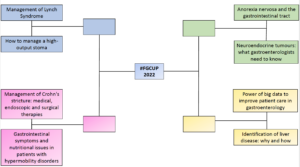As 2022 draws to a close we offer our thanks to our authors, reviewers and readers on another productive year! FG is delighted to publish pragmatic and useful advice from experts in the field, enabling practicing gastroenterologists to keep abreast of changing practice. Here we highlight the best of 2022’s papers selected by Editor-in-chief Professor Mark Beattie, which will go head-to-head in competition for our #FGCup readers’ choice award.
The development of strictures in Crohn’s disease, unfortunately, remains a common complication of the disease, with almost 50% patients developing one in their lifetime. But their management can be challenging, especially in the acute setting. When is medical management appropriate, and when should we defer to our surgical colleagues? Ismail et al. gave us a thorough overview of the data to drive decision-making when presented with these patients.1 Similarly, though most of us will have encountered patients suffering with a high-output stoma, Jeremy Nightingale gave a textbook review of the physiology behind fluid losses, with detailed practical guidance on how to stem the flow.2
Change is afoot in the management of Lynch syndrome.3 With the introduction of Lynch syndrome testing in the National Genomic Test Directory, histology from all relevant tumour types should now undergo genetic testing, helping to identify the 95% sufferers who are as yet undiagnosed. From April 2023, colonoscopic surveillance for patients with Lynch syndrome will also be undertaken as part of the bowel cancer screening programme (BCSP). Hear Dr Kevin Monahan discuss the implications for patients on our FG podcast. Neuroendocrine tumours (NETs) represent another malignant syndrome in which the diagnostic journey can be long and complicated, due to their diverse locations and wide range of presenting symptoms. Khan and Pritchard provide a comprehensive review for the general gastroenterologist on managing patients with NETs, including the non-tumour-associated gastrointestinal problems some patients experience.4
Many gastroenterologists feel a sense of trepidation when managing patients with psychological or psychiatric comorbidity, perhaps because we feel out of our depth. Jafar and Morgan highlight the plethora of gastrointestinal symptoms that may present in patients with anorexia nervosa, from gingivitis and reduced saliva production to pelvic floor dysfunction.5 They provide practical guidance on managing common complications, which informed an engaging 2022 Twitter #FGDebate. Similarly, Lam et al. described evidence-based management of gastrointestinal symptoms in patients with hypermobility syndromes, in an effort to reduce heterogeneity in patient outcomes.6
The future of gastroenterology will undoubtedly require technological advancement, with the collection and analysis of big data forming an integral part of the drive for improvement. Catlow et al. gave us a glimpse of the future, giving clear examples of how big data is already driving advances in patient care both in colorectal cancer and inflammatory bowel disease.7 The detection of liver disease in at-risk populations is also ripe for improvement, with mortality from chronic liver disease increasing dramatically over the last 50 years. Macpherson and colleagues set out principles to improve diagnosis and identify areas of contention for further research.8
We look forward to the (friendly!) competition as the editor’s choices go head-to-head in the selection for our readers’ favourite FG paper of 2022. Follow along and be sure to cast your votes as part of the #FGCup. Here’s to another year of excellent content!
Merry Christmas and a Happy New Year from the outgoing Trainee Associate Editors: Jennie Clough, Aditi Kumar and Oliver Tavabie
- Ismail MS, Charabaty A. Management of Crohn’s stricture: medical, endoscopic and surgical therapies. Frontline Gastroenterol. 2022;13(6):524-530. doi:10.1136/FLGASTRO-2021-101827
- Nightingale JMD. How to manage a high-output stoma. Frontline Gastroenterol. 2022;13(2):140-151. doi:10.1136/FLGASTRO-2018-101108
- Edwards P, Monahan KJ. Diagnosis and management of Lynch syndrome. Frontline Gastroenterol. 2022;13(e1):e80-e87. doi:10.1136/FLGASTRO-2022-102123
- Khan MS, Pritchard DM. Neuroendocrine tumours: what gastroenterologists need to know. Frontline Gastroenterol. 2022;13(1):50-56. doi:10.1136/FLGASTRO-2020-101431
- Jafar W, Frontline MJ. Anorexia nervosa and the gastrointestinal tract. Frontline Gastroenterol. 2022;13(4):316-324. doi:10.1136/FLGASTRO-2021-101857
- Lam C, Amarasinghe G, Zarate-Lopez N, et al. Gastrointestinal symptoms and nutritional issues in patients with hypermobility disorders: assessment, diagnosis and management. Frontline Gastroenterol. 2023;14(1):68-77. doi:10.1136/FLGASTRO-2022-102088
- Catlow J, Bray B, Morris E, Rutter M. Power of big data to improve patient care in gastroenterology. Frontline Gastroenterol. 2022;13(3):237-244. doi:10.1136/FLGASTRO-2019-101239
- Macpherson I, Abeysekera KWM, Harris R, et al. Identification of liver disease: why and how. Frontline Gastroenterol. 2022;13(5):367-373. doi:10.1136/FLGASTRO-2021-101833
